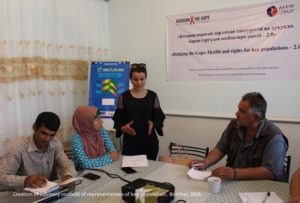 Newly detected HIV cases in Tajikistan increased by 25% in 2010. Key populations most affected by HIV are people who use drugs (13.5%), gay men or other men who have sex with men (2.7%) and sex workers (3.5%). There is a growing concern that the prevalent pathway of HIV transmission has been radically changed from injecting drugs to sexual transmission. Moreover, HIV is also found more among migrants. This group often does not have knowledge of HIV prevention tools or has no access to health care services. Partners of migrants are now getting HIV as well. The fact that more women live with HIV also risks an increase in mother-to-child transmission.
Newly detected HIV cases in Tajikistan increased by 25% in 2010. Key populations most affected by HIV are people who use drugs (13.5%), gay men or other men who have sex with men (2.7%) and sex workers (3.5%). There is a growing concern that the prevalent pathway of HIV transmission has been radically changed from injecting drugs to sexual transmission. Moreover, HIV is also found more among migrants. This group often does not have knowledge of HIV prevention tools or has no access to health care services. Partners of migrants are now getting HIV as well. The fact that more women live with HIV also risks an increase in mother-to-child transmission.
In 2018, AFEW-Tajikistan expanded its NGO testing services for females who use drugs, sexual partners of people who use drugs (PUD), female prisoners and women living with HIV. With the aim of increased inclusion of people who use the services, Key Population Advisory Councils (KPACs) were established in four cities in Tajikistan: Bokhtar, Dushanbe, Khujand and Kulob. The KPACs represented people living with HIV, sex workers and people who use drugs. Per city, the KPAC consists of four members who serve a term of two years. These members bring recommendations forward and involve the service beneficiaries more closely.
The Tajikistan network of Women Living with HIV (TNW+) started mentoring the KPACs and introduced evaluation tools for people who use the services. While the members of the councils are changing a lot and regular training among members of the current KPACs is still desired, the councils now have a patient-complaint procedure. The concept of “being asked for feedback on your service” is new to Tajikistan and is showing results. In 2018, 85% of all total complaints received were positively resolved. The councils received training and have become convinced of the belief that they could change not only their lives but also society. Apart from monitoring tasks, the members of the councils also offer support on paralegal counselling and peer-to-peer education.
“A woman who used drugs gave birth to a baby. The Drug Treatment Service of Bokhtar has people show up and get their methadone before noon. Sometimes this woman was late because of all the duties with a baby. Therefore, she sought help in a civil society organisation, which contacted the administration of the methadone site. Now the centre is open until 2 pm, and the woman I mentioned before can get her methadone easier.”
Takhmina Khaidarova, TNW+
The expansion of service delivery for Civil Society Organisations in Tajikistan has led to a bigger coverage of services for key populations. People who use the services are now taking part in the development of services, planning and implementation of activities and the evaluation of provided services. It has also led to an improvement in providing services with longer opening hours, shorter waiting times in health facilities and friendlier attitudes of medical staff. Besides, TNW+ is linked to the daily reality of the people who use the services. The government considers civil society accountable for monitoring the services, providing feedback and seeing changes.
By integrating TNW+ and service beneficiaries into a system of service delivery, both the community network and the service beneficiaries are strengthened. This leads to more gender-sensitive services for female PUD, (ex)-prisoners and sexual partners of PUD.



